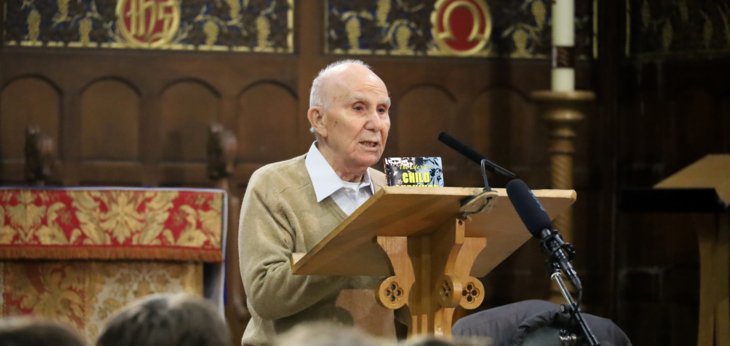Pupils are celebrating today after receiving an astonishing 43 offers from either the University of Oxford or the University of Cambridge – the highest number in the College’s history. We are immensely proud of our pupils - a huge congratulations!


On Thursday morning, the Upper Fifth and Lower Sixth were grateful to hear from Benjamin Midler, a 95-year-old Holocaust survivor.
Born in Bialystok, Poland in 1928, he was 12 years old when the German army invaded Poland. Throughout his teenage years he was imprisoned in six Nazi concentration camps, as Mr Midler delivered a deeply moving account of his experiences during the Holocaust.
Upon the Nazi occupation of Poland, his entire family was forced into the Bialystok Ghetto. Mr Midler recalls witnessing over 1,000 Jews being pushed inside a synagogue which was then set on fire. His father and uncle died in the Ghetto, but his remaining family members were loaded into trains bound for concentration camps. Mr Midler was sent first to the Majdenek concentration camp, and later to Blizyn, Auschwitz-Birkenau, Oranienburg, Sachsenhausen, and Ohrdruf, from which he was liberated.
Mr Midler showed us the inmate number etched onto the inside of his arm, explaining how in Auschwitz-Birkenau the numbers were tattooed onto the inside of a person’s arm to distinguish them from the inmates in Auschwitz I, where the numbers were on the outside. He recalls standing on his tiptoes to appear taller, so that he would be allocated to do harsh slave labour instead of being immediately killed.
Mr Midler said that his willingness to accept any work from the Nazis and always being the first in line to volunteer was the key to his survival. Mr Midler was liberated when World War II ended in 1945, the only survivor from his family. With no home in Bialystok to which to return, he spent half a year with other Jewish refugees in a camp in Cyprus.
He was then packed into a cramped fishing-boat bound for Israel. He spent more than a decade there before moving to the US. Following the talk, Mr Midler kindly offered to do a smaller Q&A session with some of those who are visiting Auschwitz-Birkenau next month. What struck those listening was his remarkable positivity and firm belief in looking to the future with hope and determination.
Mr Midler has dedicated his life to educating future generations about the Holocaust. He emphasised the important role that education plays in cultivating mutual respect between people of different faiths, which will ensure that such atrocities are never repeated.
